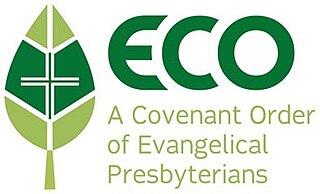Related Research Articles

Presbyterianism is a Reformed (Calvinist) Protestant tradition named for its form of church government by representative assemblies of elders. Though there are other Reformed churches that are structurally similar, the word Presbyterian is applied to churches that trace their roots to the Church of Scotland or to English Dissenter groups that formed during the English Civil War.

The Presbyterian Church (USA), abbreviated PCUSA, is a mainline Protestant denomination in the United States. It is the largest Presbyterian denomination in the country, known for its progressive stance on doctrine and its ordaining of women and members of the LGBT community as elders and ministers. The Presbyterian Church (USA) was established with the 1983 merger of the Presbyterian Church in the United States, whose churches were located in the Southern and border states, with the United Presbyterian Church in the United States of America, whose congregations could be found in every state.

The Presbyterian Church in America (PCA) is the second-largest Presbyterian church body, behind the Presbyterian Church (USA), and the largest conservative Calvinist denomination in the United States. The PCA is Reformed in theology and presbyterian in government.
The Orthodox Presbyterian Church (OPC) is a confessional Presbyterian denomination located primarily in the United States, with additional congregations in Canada, Bermuda, and Puerto Rico. It was founded by conservative members of the Presbyterian Church in the United States of America (PCUSA), who objected to the rise of Liberal and Modernist theology in the 1930s. The OPC is considered to have had an influence on evangelicalism far beyond its size.

The Associate Reformed Presbyterian Church (ARPC) is a theologically conservative denomination in North America. The ARPC was formed by the merger of the Associate Presbytery (seceder) with the Reformed Presbytery (covenanter) in 1782. It is one of the oldest conservative denominations in the United States.

The Evangelical Presbyterian Church (EPC) is an American church body holding to presbyterian governance and Reformed theology. It is a conservative Calvinist denomination. It is most distinctive for its approach to the way it balances certain liberties across congregations on "non-essential" doctrines, such as egalitarianism in marriage or the ordination of women, alongside an affirmation of core "essential" doctrinal standards.

The Presbyterian Church in the United States of America (PCUSA) was a Presbyterian denomination existing from 1789 to 1958. In that year, the PCUSA merged with the United Presbyterian Church of North America. The new church was named the United Presbyterian Church in the United States of America. It was a predecessor to the contemporary Presbyterian Church (USA).

The Reformed Church in the United States (RCUS) is a Protestant Christian denomination in the United States. The present RCUS is a conservative, Calvinist denomination. It affirms the principles of the Reformation: Sola scriptura, Solus Christus, Sola gratia, Sola fide, and Soli Deo gloria. The RCUS has membership concentrated in the Midwest and California.
The Reformed Presbyterian Church in the United States was a small Presbyterian denomination based in the United States that merged into the Vanguard Presbytery. The RPCUS was established in 1983, subscribes to the unrevised Westminster Confession and upholds biblical inerrancy. The denomination self-identified as theonomic.

The Bible Presbyterian Church is an American Protestant denomination in the Calvinist tradition. It was founded by members of the Presbyterian Church of America over differences on Eschatology and Abstinence, after having left the Presbyterian Church in the United States of America over the rise of Modernism.

The Reformed Presbyterian Church General Assembly (RPCGA) is a Presbyterian church body and conservative denomination in the United States established in 1991. The RPCGA was founded by members of the Reformed Presbyterian Church in the United States.
The Reformed Presbyterian Church - Hanover Presbytery is a very conservative Protestant, Presbyterian denomination, founded in 1991, with congregations in United States and also in Brazil.
The Covenant Presbyterian Church (CPC) is a Protestant, Reformed denomination, founded in the United States in 2006 by a group of churches that split from the Reformed Presbyterian Church General Assembly.

ECO: A Covenant Order of Evangelical Presbyterians is an evangelical Presbyterian denomination in the United States. As a Presbyterian church, ECO adheres to Reformed theology and Presbyterian polity. It was established in 2012 by former congregations and members of the Presbyterian Church (USA), abbreviated PC(USA). Denominational disputes over theology—particularly ordination of practicing homosexuals as pastors and gay marriage—and bureaucracy led to the founding of ECO. In 2018, ECO has over 383 congregations, 103,425 covenant partners and over 500 pastors. ECO churches are egalitarian in beliefs and ordain women as pastors and elders.
The Presbyterian Church of the Philippines (PCP), officially The General Assembly of the Presbyterian Church of the Philippines, is a growing evangelical, Bible-based Reformed church in the Philippines. It was officially founded by in 1986 and the General Assembly was organized in September 1996.

Presbyterianism has had a presence in the United States since colonial times and has exerted an important influence over broader American religion and culture.
The Evangelical Reformed Presbyterian Church (ERPC) was a denomination Presbyterian, formed in 2006, by churches that separate of Presbyterian Church in America and Orthodox Presbyterian Church, on the charge that both denominations would be tolerant of the Federal Vision of Covenant Theology.

The Presbyterian Reformed Church in India (PRCI) is a Presbyterian denomination, established in South India, in 2015, as a result of the missionary work of the Presbyterian Church of Brazil in Goa, Maharashtra and Chhattisgarh.
The Evangelical Presbyterian Church of Sikkim (EPCS) is a Presbyterian denomination that was established in Sikkim in 1993 by various churches that broke away from the Church of North India. As of 2014, it is the largest Christian denomination in Sikkim.
References
- ↑ "Churches Federated to the Covenant Reformed Presbyterian Church" . Retrieved April 2, 2024.
- 1 2 3 "Covenant Reformed Presbyterian Church" (PDF). Presbyterian News. p. 15. Retrieved January 21, 2022.
- ↑ "Report on Presbyterian Denominations in the United States". February 15, 2014. Archived from the original on November 11, 2014. Retrieved January 21, 2022.
- ↑ "History of the Covenant Reformed Presbyterian Church" . Retrieved January 21, 2022.
- ↑ Hübner, Jamin A. (January 2019). "Doctrines of the Covenant Reformed Presbyterian Church". Canadian American Theological Review: 54. Retrieved January 21, 2022.
- ↑ "Reformed and Presbyterian Churches". Britannica. Retrieved January 21, 2022.
- ↑ Gary Scott Smith; P. C. Kemeny (2019). The Oxford Handbook of Presbyterianism. Oxford University Press. p. 192. ISBN 9780190608392 . Retrieved January 17, 2022.
- ↑ "Calvinismo in South America:Suriname". August 7, 2018. Retrieved June 25, 2021.
- ↑ Clifton L. Holland (April 12, 2017). "Covenant Reformed Presbyterian Church in Suriname" (PDF). p. 20. Archived from the original (PDF) on February 4, 2022. Retrieved January 21, 2022.
- ↑ "Joint meeting of the Alliance Reformed Presbyterian Church and the Presbytery of Hanover" . Retrieved November 17, 2016.
- ↑ "Impediments to the union of the Alliance Reformed Presbyterian Church and the Hanover Presbytery" . Retrieved November 17, 2016.
- ↑ "Report of the Presbytery Meeting of the Covenant Reformed Presbyterian Church". June 29, 2004. Retrieved January 22, 2022.
- ↑ "History of the Westminster Presbyterian Church in the United States". Monergism. Retrieved January 17, 2022.
- ↑ "History of the Westminster Presbyterian Church in the United States". Churches in the USA. Retrieved January 17, 2022.
- ↑ "History of the Westminster Evangelical Presbyterian Church" . Retrieved January 17, 2022.